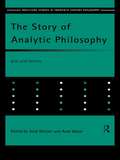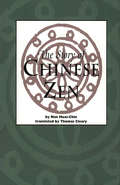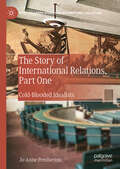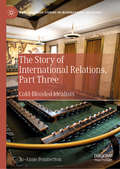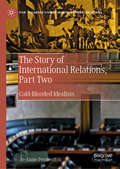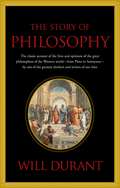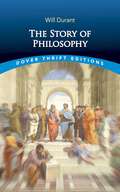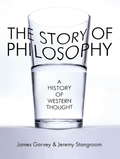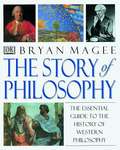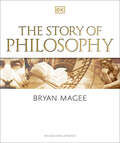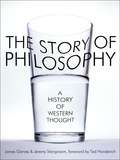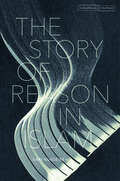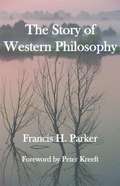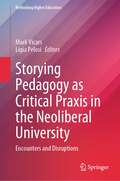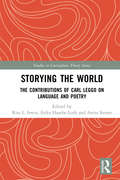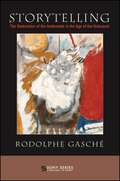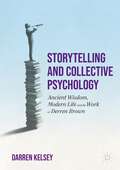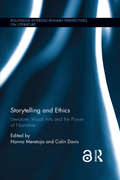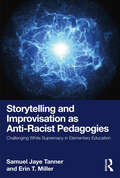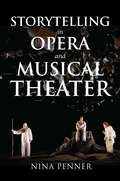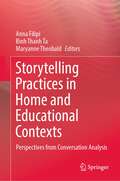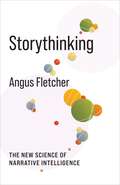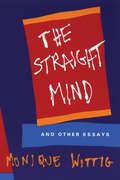- Table View
- List View
The Story of Analytic Philosophy: Plot and Heroes (Routledge Studies in Twentieth-Century Philosophy #Vol. 1)
by Anat Biletzki Anat MatarThis unique collection looks at analytic philosophy in its historical context. Prominent philosophers discuss key figures, including Russell and Wittgenstein, methods and results in analytic philosophy to present its story. This volume assesses the challenge posed by changing cultural and philosophical trends and movements.
The Story of Chinese Zen
by Thomas Cleary Nan Huai-ChinThe development of Zen in China is really the story of the flourishing of Chinese philosophy, arts and literature beginning as far back as the Han Dynasty and earlier. Master Nan Huai-Chin offers an engaging chronicle of both in this groundbreaking work.
The Story of Chinese Zen
by Thomas Cleary Nan Huai-ChinThe development of Zen in China is really the story of the flourishing of Chinese philosophy, arts and literature beginning as far back as the Han Dynasty and earlier. Master Nan Huai-Chin offers an engaging chronicle of both in this groundbreaking work.
The Story of International Relations, Part One: Cold-Blooded Idealists (Palgrave Studies in International Relations)
by Jo-Anne PembertonThis book is the first volume in a trilogy that traces the development of the academic subject of International Relations, or what was often referred to in the interwar years as International Studies. This first volume takes on the origins of International Relations, beginning with the League of Nations and the International Studies Conference in Berlin in 1928 and tracing its development through the Paris Peace Conference, the quest for cooperation in the Pacific, the Institute of Pacific Relations and lessons from Copenhagen, Shanghai and Manchuria. This project is an impressive and exhaustive consideration of the evolution of IR and is aptly published in celebration of the discipline's centenary.
The Story of International Relations, Part Three: Cold-Blooded Idealists (Palgrave Studies in International Relations)
by Jo-Anne PembertonThis book is the third volume in a trilogy that traces the development of the academic subject of International Relations, or what was often referred to in the interwar years as International Studies. This volume explores how International Relations progressed through the 20th century looking specifically at World War II, from the looming world war to the post-War reconstruction in Europe. This one of a kind project takes on the task of reviewing the development of IR, aptly published in celebration of the discipline’s centenary.
The Story of International Relations, Part Two: Cold-Blooded Idealists (Palgrave Studies in International Relations)
by Jo-Anne PembertonThis book is the second volume in a trilogy that traces the development of the academic subject of International Relations, or what was often referred to in the interwar years as International Studies. In this volume, the author begins with the 1932 Mission to China and conference in Milan, examines the International Studies Conference, reviews the Hoover Plan, the MacDonald Plan, the fate of the World Disarmament Conference, and the League of Nations’ role in the discipline. This one of a kind project takes on the task of reviewing the development of IR, aptly published in celebration of the discipline’s centenary.
Story of Philosophy: The Lives And Opinions Of The Great Philosophers
by Will DurantA brilliant and concise account of the lives and ideas of the great philosophers -- Plato, Aristotle, Bacon, Spinoza, Voltaire, Kant, Schopenhauer, Spencer, Nietzsche, Bergson, Croce, Russell, Santayana, James and Dewey -- The Story of Philosophy is one of the great books of our time. Few write for the nonspecialist as well as Will Durant, and this book is a splendid example of his eminently readable scholarship. Durant's insight and wit never cease to dazzle; The Story of Philosophy is a key book for any reader who wishes to survey the history and development of philosophical ideas in the Western world.yle. The Story of Philosophy opens vistas of intellectual adventure and growth to those who hunger for the total perspective that is philosophy. Within its pages, Durant seeks the wisest and most indestructible answers from the world's greatest philosophers to the persistent and fundamental questions about first and last things.
The Story of Philosophy (Dover Thrift Editions: Philosophy)
by Will DurantPulitzer Prize–winning author Will Durant chronicles the lives and ideas of several key philosophical thinkers throughout history in this informative and eminently readable text. Beginning with Socrates and Plato and concluding with Friedrich Nietzsche, with twelve other prominent philosophers in between, the author builds a history of philosophy by showing how each thinker’s ideas informed and influenced the next generation. An essential read for anyone fascinated by the development of Western philosophy.
The Story of Philosophy: A History of Western Thought
by James Garvey Jeremy StangroomThe Story of Philosophy sees philosophy for what it is: a passionate, exhilarating quest for human understanding that cannot be reduced to dry categories or simple definitions. It's a story with plot twists, a murder, accidental discoveries, disastrous love affairs, geniuses, idiots, monks, and vagabonds. At the heart of it all are the ideas and obsessions that have captured great thinkers from the very beginning. Packed with intriguing anecdotes and fascinating detail, James Garvey and Jeremy Stangroom bring us face to face with the most important philosophers in western history. Rigorous, refreshingly free of academic jargon, and highly accessible, this is the ideal introduction for anyone who wants to gain a new perspective on philosophy's biggest thoughts.
The Story of Philosophy: A History of Western Thought
by James Garvey Jeremy StangroomThe Story of Philosophy sees philosophy for what it is: a passionate, exhilarating quest for human understanding that cannot be reduced to dry categories or simple definitions. It's a story with plot twists, a murder, accidental discoveries, disastrous love affairs, geniuses, idiots, monks, and vagabonds. At the heart of it all are the ideas and obsessions that have captured great thinkers from the very beginning. Packed with intriguing anecdotes and fascinating detail, James Garvey and Jeremy Stangroom bring us face to face with the most important philosophers in western history. Rigorous, refreshingly free of academic jargon, and highly accessible, this is the ideal introduction for anyone who wants to gain a new perspective on philosophy's biggest thoughts.
The Story of Philosophy
by Bryan MageePhilosophy is a subject that influences many aspects of our lives and our understanding of our experiences, yet it can seem dauntingly inaccessible. Unrivaled in its clarity and insight, The Story of Philosophy is an approachable guide to the history of ideas and thinking. History of Western Philosophy: Professor Bryan Magee traces 2,500 years of Western philosophy from the Ancient Greeks to modern thinkers. His deep appreciation of the subject and grasp of its complexities have enabled him to produce a book accessible to the general reader, yet substantial enough for the more experienced student. What Is Philosophy?: Philosophers question the fundamental principles underlying all knowledge and existence. Among the important philosophical issues that The Story of Philosophy addresses are questions such as "What is being?" and "Can the existence of God be proved?" Covering every major philosopher from Plato to Popper via Saint Augustine, Locke, and Nietzsche, Bryan Magee opens up the world of ideas in a way that is easily understood by everyone. Additional background information puts the philosophers in historical context with the influences that shaped their lives and work. Comprehensive, highly visual, and filled with penetrating observations, The Story of Philosophy is the essential guide to this fascinating subject.
The Story of Philosophy
by Bryan MageeThis essential guide to philosophy includes thoughts on our modern society, exploring science and democracy, and posing the question: where do we go from here? Easy-to-understand text is accompanied by works of art and artifacts from history, as the big ideas and important thinkers are introduced through time. Famous quotes are highlighted, and the sidebars discuss other ideas or key works to include extra context around the theories and people. Celebrate the world's most revolutionary concepts and understand how these ideas continue to shape our world. Develop your own perspectives and explore relevant issues such as modern logic and religion with this wonderfully comprehensive illustrated guide. In a world of evolving ideas, this book is a fantastic resource to revisit again and again.
The Story of Philosophy
by Jeremy Stangroom James GarveyThe Story of Philosophy sees philosophy for what it is: a passionate, exhilarating quest for human understanding that cannot be reduced to dry categories or simple definitions. Accessible writing, brilliant scholarship and over 150 colour illustrations combine to form a richly informative and highly entertaining work of narrative history.Packed with intriguing anecdotes and fascinating detail, James Garvey and Jeremy Stangroom bring us face to face with the most important philosophers in western history. The story begins with the Ancient Greeks, Socrates, Plato and Aristotle, great thinkers who set the philosophical agenda to this day. It continues with Greek and Roman philosophers--slaves and emperors who found consolation in deep thoughts about life and death--and moves on to the religious thinkers of the Middle Ages. The origins of modern science, politics, and morality are examined, alongside theories of knowledge, logic, mind and matter. Along the way, you'll discover Descartes' evil demon, Locke on the limits of knowledge, Rousseau and Hobbes on human nature, Hume's scepticism, Kant on duty, Nietzsche's Superman, Marx on class struggle, Russell's logic, Wittgenstein on meaning, Sartre on bad faith, Foucault's take on power, and much more.Rigorous, refreshingly free of academic jargon, and highly accessible, this is the ideal introduction for anyone who wants to gain a new perspective on philosophy's deepest mysteries and most intriguing discoveries.
The Story of Reason in Islam
by Sari NusseibehIn The Story of Reason in Islam, leading public intellectual and political activist Sari Nusseibeh narrates a sweeping intellectual history--a quest for knowledge inspired by the Qu'ran and its language, a quest that employed Reason in the service of Faith. Eschewing the conventional separation of Faith and Reason, he takes a fresh look at why and how Islamic reasoning evolved over time. He surveys the different Islamic schools of thought and how they dealt with major philosophical issues, showing that Reason pervaded all disciplines, from philosophy and science to language, poetry, and law. Along the way, the best known Muslim philosophers are introduced in a new light. Countering received chronologies, in this story Reason reaches its zenith in the early seventeenth century; it then trails off, its demise as sudden as its appearance. Thereafter, Reason loses out to passive belief, lifeless logic, and a self-contained legalism--in other words, to a less flexible Islam. Nusseibeh's speculations as to why this occurred focus on the fortunes and misfortunes of classical Arabic in the Islamic world. Change, he suggests, may only come from the revivification of language itself.
The Story of Western Philosophy, 2nd Edition
by Francis H. ParkerThis book is a guide to the interpretation of the history of Western philosophy. It is designed especially for use in a course in the history of philosophy. It may also prove useful for other purposes, such as an historical introduction to philosophy or a comprehensive review of the history of philosophy or just as a help to the general reader trying to make some sense out of the history of Western philosophy.
Storying Pedagogy as Critical Praxis in the Neoliberal University: Encounters and Disruptions (Rethinking Higher Education)
by Mark Vicars Ligia PelosiThis book examines how teaching and learning and teacher and student identities are being reframed in higher education by neoliberal policies and practices. It shares how teachers perform teaching and learning duties in relation to prescribed institutional policies and how teachers insert dissonant pedagogies as a critical practice.The book explores narrative pedagogy as a disruptive presence and a space for critique. It interrogates personal/professional experience of educational systems that present educators juggling complexity and meeting competing demands to make learning meaningful for students. Each contribution will act as a counterpoint and provide a synoptic method for comparison. The book re-constructs meaning from the generic narrative of the public face of education, which homogenizes and diminishes collective understandings of teachers and teaching. This book provides a contemporary account of the social realities experienced within the higher education classroom across the globe.
Storying the World: The Contributions of Carl Leggo on Language and Poetry (Studies in Curriculum Theory Series)
by Rita Irwin Erika Hasebe-Ludt Anita SinnerBringing together Carl Leggo’s most significant contributions over the past 30 years, this book celebrates his work in curriculum studies, English language arts, literacy and life writing, poetry, and arts education. Organized around three thematic sections—Loving Language, Narrating Ruminations, and Storying the World—the volume highlights his efforts across interrelated fields of inquiry, including narrative and poetic inquiry, contemplative inquiry, and social fiction. The text extends the discussion and conversation of curriculum studies and is greatly enhanced with a selection of original poetry by this incomparable poet, scholar, and teacher. Carl Leggo is renowned not only for his ground-breaking work at the University of British Colombia, but also for his tremendous influence on graduate education across the English-speaking world. This volume honours that immense contribution in today’s time of academic change and development.
Storytelling: The Destruction of the Inalienable in the Age of the Holocaust (SUNY series, Literature . . . in Theory)
by Rodolphe GaschéIn Storytelling, Rodolphe Gasché reexamines the muteness of Holocaust survivors, that is, their inability to tell their stories. This phenomenon has not been explained up to now without reducing the violence of the events to which survivors were subjected, on the one hand, and diminishing the specific harm that has been done to them as human beings, on the other. Distinguishing storytelling from testifying and providing information, Gasché asserts that the utter senselessness of the violence inflicted upon them is what inhibited survivors from making sense of their experience in the form of tellable stories. In a series of readings of major theories of storytelling by three thinkers—Wilhelm Schapp, whose work will be a welcome discovery to many English-speaking audiences, Walter Benjamin, and Hannah Arendt—Gasché systematically assesses the consequences of the loss of the storytelling faculty, considered by some an inalienable possession of the human, both for the victims' humanity and for philosophy.This book is freely available in an open access edition thanks to Knowledge Unlatched—an initiative that provides libraries and institutions with a centralized platform to support OA collections and from leading publishing houses and OA initiatives. Learn more at the Knowledge Unlatched website at: https://www.knowledgeunlatched.org/, and access the book online at the SUNY Open Access Repository at http://hdl.handle.net/20.500.12648/7236.
Storytelling and Collective Psychology: Ancient Wisdom, Modern Life and the Work of Derren Brown
by Darren KelseyThis book examines the work of psychological illusionist Derren Brown to understand the significance of storytelling and ancient philosophy in our society. Reflecting on the social disconnection and political polarisation of recent times, Darren Kelsey considers how we can rebuild a sense of collective cohesion and common good, weaving together contemporary psychology with ancient Stoicism to cut through the noise of modern life. Kelsey shows that Brown is more than a stage performer: he’s an enlightened magician who offers us guidance for navigating the challenges life throws at us, using his skills and wisdom to help us better understand ourselves and enable human flourishing. In this rigorous examination of Brown’s work, Kelsey makes a compelling case for paying closer attention to our personal, cultural and political stories and beliefs to help create a better future – for ourselves, our communities, and the planet.
Storytelling and Ethics: Literature, Visual Arts and the Power of Narrative (Routledge Interdisciplinary Perspectives on Literature)
by Colin Davis Hanna MeretojaIn recent years there has been a huge amount of both popular and academic interest in storytelling as something that is an essential part of not only literature and art but also our everyday lives as well as our dreams, fantasies, aspirations, historical self-understanding, and political actions. The question of the ethics of storytelling always, inevitably, lurks behind these discussions, though most frequently it remains implicit rather than explicit. This volume explores the ethical potential and risks of storytelling from an interdisciplinary perspective. It stages a dialogue between contemporary literature and visual arts across media (film, photography, performative arts), interdisciplinary theoretical perspectives (debates in narrative studies, trauma studies, cultural memory studies, ethical criticism), and history (traumatic histories of violence, cultural history). The collection analyses ethical issues involved in different strategies employed in literature and art to narrate experiences that resist telling and imagining, such as traumatic historical events, including war and political conflicts. The chapters explore the multiple ways in which the ethics of storytelling relates to the contemporary arts as they work with, draw on, and contribute to historical imagination. The book foregrounds the connection between remembering and imagining and explores the ambiguous role of narrative in the configuration of selves, communities, and the relation to the non-human. While discussing the ethical aspects of storytelling, it also reflects on the relevance of artistic storytelling practices for our understanding of ethics. Making an original contribution to interdisciplinary narrative studies and narrative ethics, this book both articulates a complex understanding of how artistic storytelling practices enable critical distance from culturally dominant narrative practices, and analyzes the limitations and potential pitfalls of storytelling.
Storytelling and Improvisation as Anti-Racist Pedagogies: Challenging White Supremacy in Elementary Education
by Samuel Jaye Tanner Erin T. MillerThis book theorizes and describes the concept of transformative critical whiteness pedagogies that are rooted in theories and practices of improvisation. It shows how these pedagogies invite people, especially white people, into the urgent work of resisting the ongoing production and affirmation of white supremacy.Using the frameworks of storytelling and story analysis, this book uses narrative to invite the reader into ongoing work to design and make sense of teaching and learning about whiteness that would meaningfully account for a grapple with white supremacy. Chapter 1 offers the conceptual framework rooted in theories and practices of improvisation that allow for new ways to think about engaging whiteness in anti-racist pedagogies, which the authors name transformative critical whiteness pedagogies. Chapters 2–4 tell and analyze the stories that emerged out of this work to design and facilitate transformative critical whiteness pedagogies with white elementary students, white college students, and then black elementary students in the US. Chapters 5 and 6 discuss the challenges of developing and implementing transformative critical whiteness pedagogies in K-12 contexts. The final chapters offer a discussion of the improvisational ethos, as well as an overview of the authors’ ongoing work to engage people, especially white people, in getting smarter about whiteness.Using simple, straightforward language to address complex ideas about anti-racist pedagogies, this volume will be important reading for pre-service teachers and teacher educators in Critical Whiteness Studies, Critical Multicultural Education, Social Foundations of Education, Elementary Education, and Race and Culture Studies.
Storytelling in Opera and Musical Theater (Musical Meaning and Interpretation)
by Nina PennerStorytelling in Opera and Musical Theater is the first systematic exploration of how sung forms of drama tell stories. Through examples from opera's origins to contemporary musicals, Nina Penner examines the roles of character-narrators and how they differ from those in literary and cinematic works, how music can orient spectators to characters' points of view, how being privy to characters' inner thoughts and feelings may evoke feelings of sympathy or empathy, and how performers' choices affect not only who is telling the story but what story is being told. Unique about Penner's approach is her engagement with current work in analytic philosophy. Her study reveals not only the resources this philosophical tradition can bring to musicology but those which musicology can bring to philosophy, challenging and refining accounts of narrative, point of view, and the work-performance relationship within both disciplines. She also considers practical problems singers and directors confront on a daily basis, such as what to do about Wagner's Jewish caricatures and the racism of Orientalist operas. More generally, Penner reflects on how centuries-old works remain meaningful to contemporary audiences and have the power to attract new, more diverse audiences to opera and musical theater. By exploring how practitioners past and present have addressed these issues, Storytelling in Opera and Musical Theater offers suggestions for how opera and musical theater can continue to entertain and enrich the lives of 21st-century audiences.
Storytelling Practices in Home and Educational Contexts: Perspectives from Conversation Analysis
by Maryanne Theobald Anna Filipi Binh Thanh TaThis book brings together researchers from across the globe to share their work on the micro-analyses of storytelling. By doing so, the book helps to deepen the understanding of, and track storytelling practices cross-culturally and longitudinally in the home, at school, and in higher education. Through the unique focus on education and learning, this book provides a lens with which to identify how children’s and adolescents’ language development and sense of self in storytelling are supported in various contexts: the home, classroom, playground or in the higher education context. It explores the work, identity and practices of friends, teachers and lecturers in teaching, learning, reflection and supervision. Importantly, in identifying these practices, the book presents opportunities to assist parents and teachers, to inform pedagogy in teacher education, and to support effective doctoral supervision. The focus on storytelling in homes, education, and for learning, and the practical applications of the findings, contribute to the ongoing research in both education and conversation analysis. Chapter 8 is available open access under a Creative Commons Attribution 4.0 International License via link.springer.com.
Storythinking: The New Science of Narrative Intelligence (No Limits)
by Angus FletcherEvery time we think ahead, we are crafting a story. Every daily plan—and every political vision, social movement, scientific hypothesis, business proposal, and technological breakthrough—starts with “what if?” Linking causes to effects, considering hypotheticals and counterfactuals, asking how other people will react: these are the essence of narrative. So why do we keep overlooking story’s importance to intelligence in favor of logic?This book explains how and why our brains think in stories. Angus Fletcher, an expert in neuroscientific approaches to narrative, identifies this capacity as “storythinking.” He demonstrates that storythinking is fundamental to what makes us human. Artificial intelligence can perform symbolic logic, rational deduction, and mathematical calculation, but it is incapable of deliberating in narrative. Drawing on new research in neuroscience and narrative theory, Fletcher explores the nature of imagination, innovation, and creativity. He provides concise answers to big questions: How does storythinking work? Why did it evolve? How can it misfire? What problems can it solve?Revealing the significance of storythinking from science to business to philosophy, this book also provides ways for readers to harness its power to script better tomorrows.
The Straight Mind: And Other Essays
by Monique WittigThese political, philosophical, and literary essays mark the first collection of theoretical writing from the acclaimed novelist and French feminist writer Monique Wittig.&“Among the most provocative and compelling feminist political visions since The Second Sex. These essays represent the radical extension of de Beauvoir&’s theory, its unexpected lesbian future. Wittig&’s theoretical insights are both precise and far-reaching, and her theoretical style is bold, incisive, even shattering.&”—Judith Butler, Johns Hopkins University
